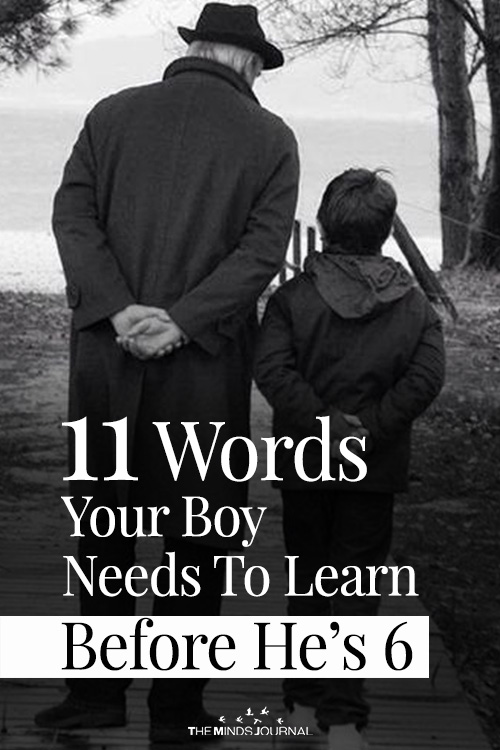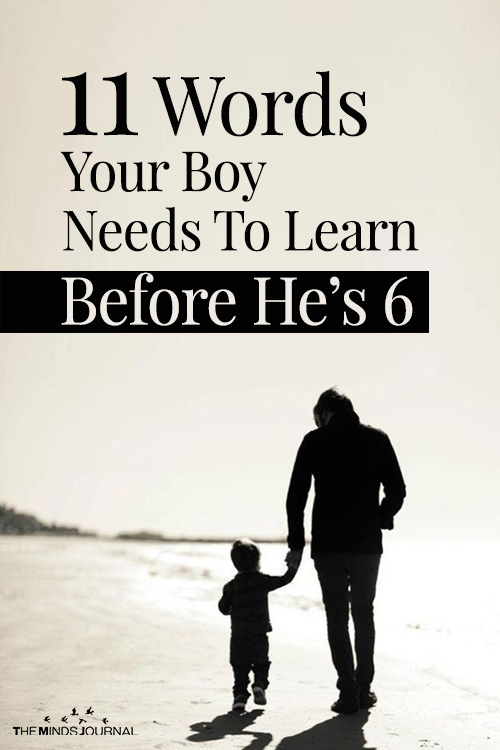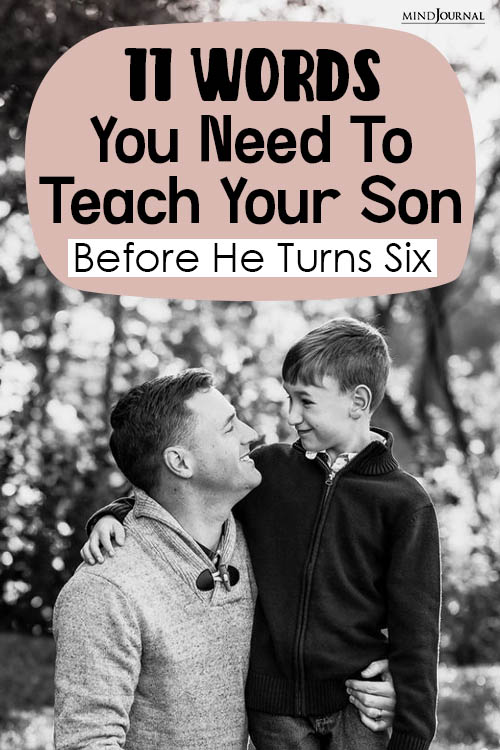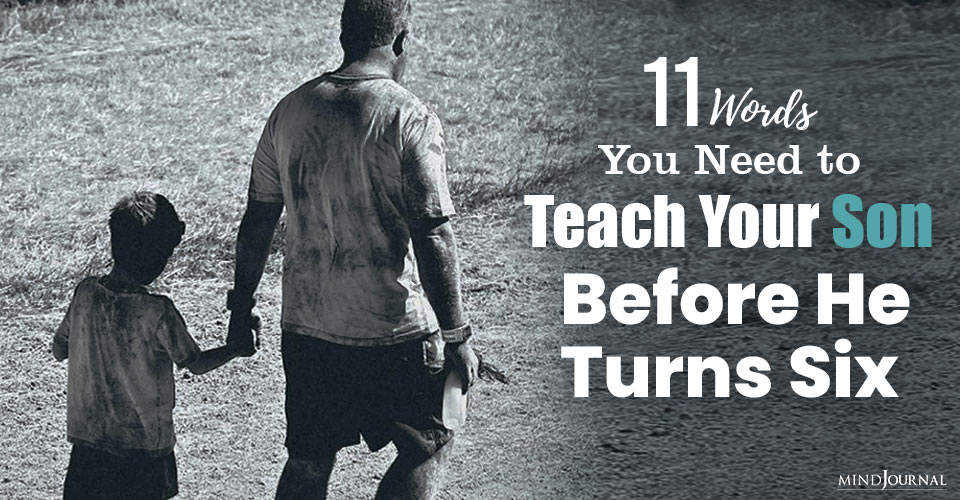Raising Conscious Boys: Parenting can be as much of a challenge as it is fun. Making sure your son grows up to be a fine gentleman would require you to be aware and careful all the time about what he is experiencing from an early age. There are certain words you need to teach your son before he turns six.
The things we say to our kids help shape their identity.
Recently, while helping in my youngest son’s art camp, I noticed one little boy falling behind the others and no longer participating.
I touched his shoulder and pointed at the teacher, as a reminder to pay attention. He ignored me and looked around the room. A few minutes later, his head was down and he wasn’t even trying.
I knelt in front of him and asked, “Why aren’t you doing the project?” He started crying.
“Everyone’s ahead. I can’t do it now. It’s too late.”
Thing was, he could have done it. They were simple steps and all laid out in front of him. He also could’ve asked for help. But he shook his head and said he couldn’t. He just couldn’t.
“Oh,” I said. “Do you feel overwhelmed?”
He looked at me funny and asked what “overwhelmed” means. When I explained that it’s a feeling you get when there’s so much happening and you just don’t know where to start, so you sort of freeze up.
His eyes lit up. “Yes!” he said, and seemed excited that someone understood exactly how he felt.
When his mom arrived to pick him up, he ran to her and said, “I was overwhelmed today, but then I got all caught up.” He shoved the craft into her hands and beamed. At that moment, it occurred to me how important it is for kids (and adults, too) to have a wide variety of words to describe feelings and situations.
As a parent, and someone who pays close attention to social issues around gender, I think it’s crucial that we make a conscious choice to arm all of our kids with words that can give them important social skills or the ability to describe feelings.
This list is for parents of kids of any gender, but I am focusing a bit on what words boys need to know, so we can help them describe things we don’t typically think of as manly or boyish.
Here are 11 words you need to teach your son before he turns six:
1. Lonely.
Loneliness often happens when you feel like nobody cares about you. As adults, we can often reason with ourselves about this feeling, but for a child it can be awfully hard to understand why people aren’t giving us what we need, emotionally, at the moment we need it.
Your kid may be resisting bedtime and say that he gets scared or sad in his room. He may actually be scared, or just sad, or he may feel very alone. Maybe you watch TV on the couch after he goes to bed, or you and your spouse sleep in the same bed without him. Being excluded from those things could be a lonely feeling for a kid.
Once you understand the nature of his feelings, you can better explain that even though he’s by himself in his bed, he’s very much loved by his family and in the morning you can all be together again.
Read: 10 Simple But Vital Life Lessons To Teach Kids Before They Turn 10
2. Frustrated.
It’s not angry. It’s not sad. It’s something else, and young children feel this sensation regularly. Imagine having to follow every command of somebody else all the time, even when their demands feel illogical. How frustrating would it be to watch other kids get to do stuff you aren’t allowed to do, just because of your size? These are the challenges kids face every day. And it’s frustrating.
And yet most little kids don’t know that word, so when they start to feel that way, they can only define it as mad. I suspect that’s why tantrums often look like little rage-fests. So get down to eye-level with your child and describe that frustration is when you get upset because you just can’t seem to do what you want to do, and maybe you don’t even know why you can’t.
Try teaching them the word, explaining the definition, and asking them to say “I’m so frustrated!” next time. Once you understand, then you can walk him through the problem and help him solve it—or at least understand the “why”.
Read: 8 Mistakes You MUST Avoid When Raising A Son
3. Intimidated.
I remember arriving at a park to play with a bunch of our preschool buddies with my son and he turned and said, “I want to go home.”
I’d driven thirty minutes to get there, and we weren’t going home. I asked him why, and all he’d say was, “Because.”
“Because what?”
Nothing.
Finally, he said, “I’m scared.”
There was nothing to be scared of, and I told him that, not realizing that I was invalidating his feelings at that moment. He was safe, he’d played there before, and I was right next to him.
Finally, he explained that he felt like his friends were all together and he didn’t know what they were playing. I realized then that he wasn’t scared, he was intimidated. He felt unprepared and unworthy. Once I understood that, I was able to solve the problem. And once he knew the word, he used it frequently in situations like that.
4. That’s just not my thing.
This is a funny one, but it’s something we’ve evolved in our family after a lot of trial and error.
Saying, “that’s just not my thing,” is a way for kids to back out of socially-pressured situations without seeming like they’re judging others or making a big deal out of something. This can be anything from, “Hey, why don’t you play basketball with us at recess like the other guys?” to something that he or she’s not ready to handle, like a roller coaster or a scary movie.
It can also be used to diffuse a dangerous or amoral situation like bullying or excessive risk-taking. Of course when kids are being cruel or harming someone (or themselves), you should empower your kid to stop or report them to a trusted grown-up, but he may also need an “out” for the situation that’s handy in a pinch so he can take a moment to figure out how to proceed next.
Read: 25 Rules For Mothers With Sons
5. Hangry.
Things we know about kids: They act out and get more emotional when they’re hungry. But oftentimes, they don’t realize they’re hungry! They just feel mad, and will tell you that in no uncertain terms!
We joke about the word “hangry” with our kids, but it’s a useful term because hungry anger is a pretty specific feeling, and having a word for it may help your kid feel empowered to explain exactly what he or she is feeling, and remind them to stop and eat a nutritious snack like a string cheese or some almonds, that will help stabilize his or her blood sugar and mood.
6-8. Proper names for their body parts.
Specifically: P@nis, Vagina (or vulva), and anus.
I know, there’s nothing cute or fun about talking about the accurate terminology for body parts, but it’s necessary to teach your son before he turns six. Being able to accurately describe parts of our own bodies empowers us to speak openly and honestly about them. Using these terms without shame teaches our kids that they can come to us with questions or concerns, and this is important for their health and their emotional development.
By not using cutesy terms, we raise kids who are empowered about their own bodies. We can then discuss that their genitals are their own private business and that nobody gets to touch them without permission. Likewise, we don’t touch other people’s genitals or make people feel uncomfortable.
Christopher Anderson, Executive Director of MaleSurvivor.org—an advocacy and support group for men and boys (and their loved ones) who have been sexually abused, explains further why accurate terminology is important:
Many child protection experts strongly urge parents to empower children with the proper terminology for all body parts. Doing so can have greatly improve a child’s understanding of their own bodies, which can, in turn, improve their self-image and confidence. Confident, well-educated children are also less at risk for abuse, especially sexual abuse, at the hands of perpetrators who often seek out children who are more vulnerable and less informed.
This is, of course, part of a much larger conversation, but it’s one that can help prevent your child from being abused or abusing others. This conversation has to start at age 1 and continue into their college years. For more specific instructions, see The Healthy Sex Talk, Teaching Consent Ages 1-21, which I co-authored.
I want to note that I think following your child’s lead in what they call their genitals is okay, as long as they are clear of the technical terms too. I wouldn’t stop a boy from calling his penis a “weenie” or something, as long as it was very clear he knew the word penis was accurate and totally fine to say, as well.
9. Touched-out.
This term has become synonymous with new parents who have babies climbing all over them all the time, but it’s useful in a lot of different ways, too.
Sometimes, as a parent, you just feel like you need some personal space. Maybe you’re in a bad mood, or maybe you have had a baby on you all day long. Regardless, it’s okay to lovingly tell someone—even your own child—that you’re feeling “touched out” and would like a little time where nobody is touching you. Reassure him or her that pretty soon you’ll feel like snuggling or wrestling again, but for now you need everyone to honor your “space bubble”. I always use my hands to show my kids how far around me my space bubble is, and ask them not to pop it.
Not only are you teaching them to honor others’ bodily autonomy, but if you also offer this as an option for your child, then you’re empowering him or her to say “no” to touching, even loving or innocent touch. If his little brother or sister is poking him or trying to snuggle, then he can say to you or them, “I feel touched out” and you can help advocate for his personal space.
Read: 6 Ways Parents Can Communicate Better With Their Teens (According To Teens)
10. Overwhelmed.
I talked about this at the beginning, but I want to underline the way I see this word helping kids, especially boys, in classroom settings.
Often, when we see a kid drifting or fidgeting in class we may default (even if only subconsciously) to assuming that the kid has an attention issue or just doesn’t care about school.
But what if there’s another issue? What if he really wants to engage but is overwhelmed because he’s behind, or because he can’t hear the teacher, has a distraction, or see the board well? I really do think this feeling-word could be of great service in young elementary school classrooms.
11. May I please…?
At the top of my list of things kids do that drive me crazy is when kids make demands. It drives me absolutely bonkers to hear a kid say, “Get me some milk” or “Give me that toy”. I know kids are naturally very selfish creatures, and being demanding is a part of development, but part of teaching your child empathy is asking them to consider how it feels to have someone demand something from them.
“Dad, may I please have a glass of milk?” or “Mom, could you please get me the Lego bin?” are questions that require your child to consider how you feel, what you’re doing, and how their request might affect you. If my arms are full of groceries, I hope my sons will see that and not tell me at that exact moment to open the door for them. But if we don’t teach them to ask people for things nicely, they may not learn to consider the feelings of the person they’re imposing upon.
And trust me, you child’s teacher will appreciate the good habit.
Becoming comfortable with asking for things with respect, as well as learning to be kind and gracious when someone says “no” are lessons that will carry forward into their lives as older kids, too, especially when they start dating.
Are you ready to teach your son these 11 words before he turns six?
Written by Joanna Schroeder
Originally appeared in The Good Men Project













Leave a Reply